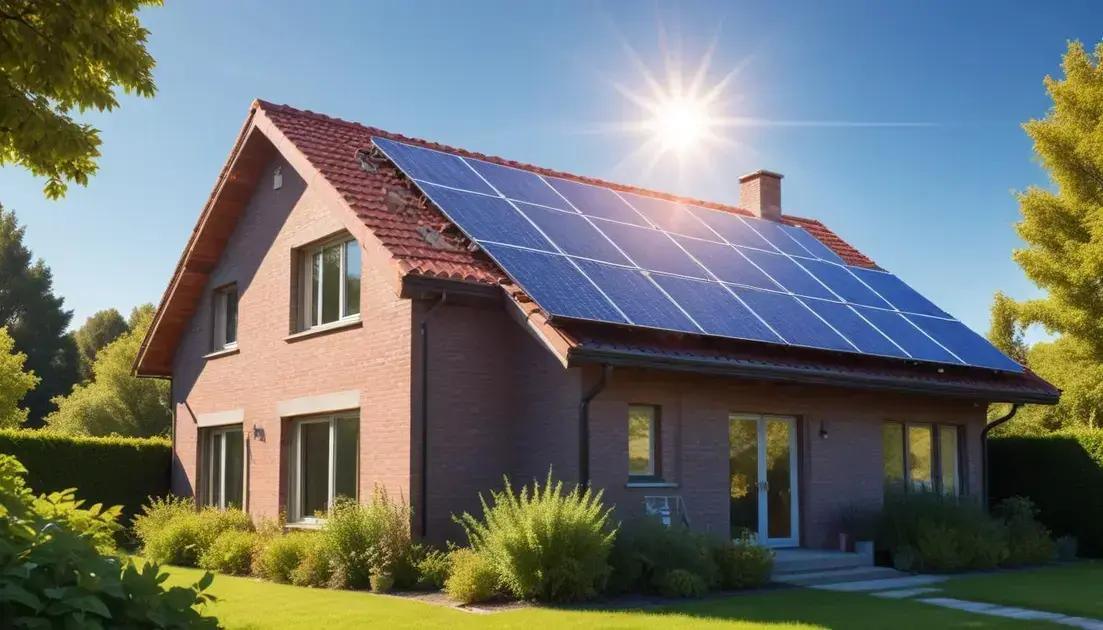
Solar Energy: Light That Becomes Electricity
Solar energy adoption offers numerous benefits, including reduced electricity bills, environmental sustainability, and energy independence. Despite initial costs and sunlight variability, advancements in solar technology, such as improved efficiency and affordable storage solutions, make it an increasingly viable option for homeowners. As support from governments grows, more people can access clean and renewable solar power, making it an essential choice for a sustainable future.
Solar energy is changing how we think about power – it’s clean, sustainable, and widely accessible. Curious about how it transforms our lives? Let’s dive in!
The Basics of Solar Energy
The basics of solar energy are pretty simple. Solar energy is the light and heat that come from the sun. We can capture this energy and turn it into electricity. This happens mainly through solar panels, which are made up of many small units called solar cells.
How Solar Panels Work
Solar panels work by using photovoltaic cells. These cells take in sunlight and convert it into direct current (DC) electricity. After that, we use an inverter to change this DC electricity into alternating current (AC), which is the type of electricity most homes use.
Parts of a Solar Panel System
A typical solar panel system includes solar panels, an inverter, a meter, and sometimes batteries. The solar panels capture sunlight. The inverter changes the power to make it usable for your home. The meter tracks how much electricity you create and use. Batteries can store excess power for later use.
Benefits of Using Solar Energy
Solar energy is renewable and abundant. It can help reduce your electricity bills and decrease your carbon footprint. Many people enjoy the idea of using energy that is clean and doesn’t pollute the air.
In sunny areas, solar can be very efficient. It can offer energy independence and resilience. By using solar power, you rely less on the grid and have a backup during outages. Overall, solar energy is a great choice for a clean and sustainable future.
How Solar Panels Work
Understanding how solar panels work is quite fascinating. Solar panels capture energy from sunlight and convert it into electricity. They do this using special cells called photovoltaic cells. These cells are made from materials that can convert sunlight directly into electricity.
When sunlight hits the photovoltaic cells, it knocks electrons loose from their atoms. This movement creates a flow of electricity. The electricity generated is direct current (DC), but most homes use alternating current (AC). So, we need an inverter to change DC into AC.
Solar panels are usually made up of many small cells joined together. Each panel can generate a certain amount of power, depending on its size and efficiency. When many panels are combined, they can produce enough electricity to power a home or business.
Another important part of the solar panel system is the inverter. This device converts the electricity from the panels into a form that can be used in your home. It also makes sure the energy flows smoothly into your electrical system.
Overall, solar panels provide a clean source of energy. They help to reduce electricity costs while also being good for the environment. With sunlight being so abundant, solar panels offer a great way to harness energy.
Benefits of Using Solar Energy
Using solar energy comes with many benefits. First, it’s a clean and renewable source of power. This means it doesn’t pollute the air or contribute to climate change. The sun provides an endless supply of energy, which is great for our planet.
One key benefit is cost savings. By installing solar panels, homeowners can lower their electricity bills. In some cases, generating your own electricity can even make you money. If you produce more energy than you use, you might receive credits from your utility company.
Solar energy also increases energy independence. Relying on the sun for power means you’re less affected by rising energy prices and grid outages. Plus, many people find confidence in knowing they’re using a local and sustainable energy source.
Another advantage is job creation. The solar industry is growing quickly, offering many job opportunities. From manufacturing panels to installing them and maintaining systems, there are many roles to fill.
Lastly, solar energy enhances home value. Homes with solar panels are often more attractive to buyers. Many see it as a smart investment for the future. Overall, using solar energy can greatly benefit both your wallet and the environment.
Challenges in Solar Energy Adoption
There are a few challenges in solar energy adoption that people should know about. One major issue is the initial cost. Installing solar panels can be expensive, even though they save money over time. Many might find it hard to pay upfront costs.
Another challenge is the variability of sunshine. Solar energy production depends on sunlight. On cloudy days or at night, energy production drops. This can make it tricky to rely only on solar power.
Space can also be a concern. Installing solar panels requires sufficient roof space or land. Not every home has the right setup for solar installations. In some cases, trees or buildings might block sunlight.
Maintenance is another factor. While solar panels are generally low-maintenance, they do require some care. Dust, dirt, and debris can reduce their efficiency. Regular cleaning is necessary to keep them working well.
Finally, there are local regulations and policies. Some places have strict rules about solar installations. These regulations can make the process longer and more complex. It’s essential to understand local laws before moving forward with solar energy.
The Future of Solar Technology
The future of solar technology looks bright and exciting. Innovations continue to change how we use solar power. One key area is efficiency. New solar panels are being developed to capture more sunlight. This means they can generate more electricity from the same amount of sunlight.
Another trend is the growth of solar storage systems. Batteries are getting better at storing energy for later use. This helps people use solar power even when the sun isn’t shining. More reliable energy storage makes solar a practical choice for homes and businesses.
Smart technology is also playing a huge role. Smart solar systems can track energy usage and adjust accordingly. This allows for better management of the energy produced, making it even more efficient.
Additionally, solar technology is becoming more affordable. Costs for solar panels and installations continue to decrease. This opens up solar energy to more people, making it easier to switch to renewable energy sources.
Finally, governmental support is growing. Many countries are offering incentives and subsidies for using solar energy. These actions encourage both individuals and businesses to adopt solar power.
Conclusion
In conclusion, adopting solar energy offers many benefits, including savings on electricity bills, energy independence, and a positive impact on the environment. Although there are challenges, like initial costs and space requirements, the future of solar technology is bright. With improvements in efficiency, storage, and affordability, more people can access this renewable energy source.
As we look ahead, support from governments and advances in technology will make solar power even more appealing. By investing in solar energy today, you’re not only saving money but also contributing to a sustainable future. Embracing solar energy is a smart choice for your home and the planet.


